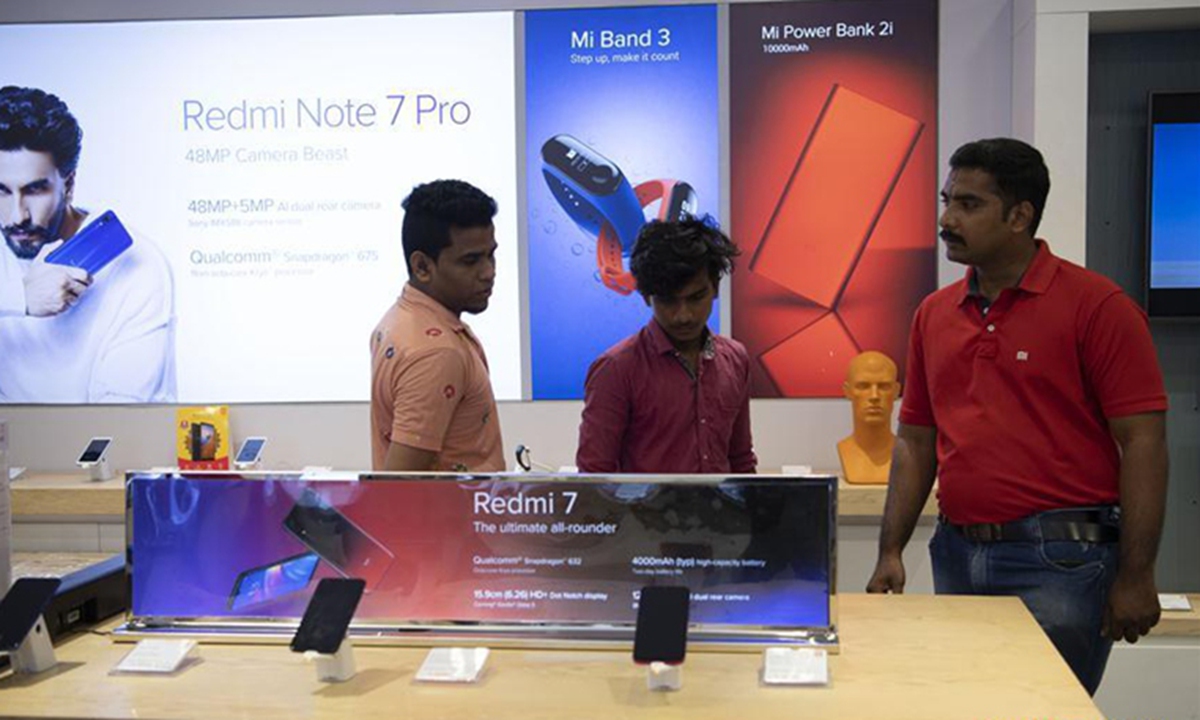COMMENTS / EXPERT ASSESSMENT
India shouldn't rush to exclude Chinese players for 5G roll-out

Customers are seen at a store of Chinese technology company Xiaomi in Chennai, India. Photo: Xinhua
Indian Home secretary Ajay Kumar Bhalla said that New Delhi was yet to make a decision on whether to allow Chinese telecom companies to participate in the upcoming 5G network construction in India, the Times of India has reported.However, the Indian official acknowledged that China's "penetration in the existing telecom hardware and software [market] was too extensive," and that, unless India could find a substitute, the existing facilities could not be quickly closed down.
So why is India moving so slowly in its 5G network construction? The South Asian country is stuck in dilemma of its own making: Indians driven by irrational and extreme anti-China sentiments call for Chinese 5G players to be excluded at all costs, but reality shows that such a strategy simply can't work.
Chief among the reasons are costs. According to media reports, the current financial stress telco providers are under may put the brakes on India's 5G ambitions. In fact, India's current 4G communications network largely relies on China's cost-effective technologies and products, and, as Bhalla noted, the existing facilities cannot be closed down abruptly.
In addition, it's unfair to let Indian telco providers pay the price of the extreme anti-China sentiment being touted by politicians to protect their own political interests.
Top Indian telecommunications carrier Bharti Airtel reportedly said that if it uses European products to replace China's 5G equipment, it may lead to "unaffordable costs." Blocking Huawei from rolling out 5G technology may cause the loss of at least $4.7 billion in India's case by 2035, a report by Oxford Economics has shown, according to media reports.
Obviously, if India aims to begin 5G network construction as soon as possible, promoting economic development in the interests of the Indian people and its telecom companies, India should be cooperating with Chinese companies sooner rather than later. For India, this is the most reasonable and feasible approach.
As for any such decision being made in the name of "national security" - a concern fabricated by the US - it shouldn't take much for Indians to realize such a fear is totally illogical and groundless. Unless they deliberately choose to hold on to these doubts against China, there is no reason for India to follow the US on the 5G issue.
Faced with the severe impact of the COVID-19 pandemic, economic contraction and other challenges, India has too many problems that need to be resolved more urgently than 5G. Perhaps India has not yet come to the point at which it must make a decision about 5G.
However, India urgently needs to separate economic issues from geopolitics and avoid going further in the wrong direction as a result of irrational and extreme emotions. To begin with, India should revise its decoupling approach in a timely manner, and remove the restrictions it imposed on Chinese companies and products - such as the previous app ban - before such measures cause larger damage to India's own economy.
The author is an associate research fellow at the National Institute of International Strategy under the Chinese Academy of Social Sciences. bizopinion@globaltimes.com.cn



